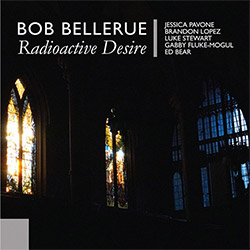
Brooklyn's Bob Bellerue is portrayed as a "creative technician" with a no-nonsense approach to equipment, environment and noise for multidisciplinary purposes. His discography comprises thought-provoking outings — among them, 2018's Music Of Liberation on this same imprint — typically investigating charged contexts via unorthodox methods. In the summer of 2020, Bellerue gathered a few collaborators to record some material after months spent without any interplay. The meeting included Jessica Pavone on viola and organ, Brandon Lopez and Luke Stewart on double bass, Gabby Fluke-Mogul on violin and Ed Bear on baritone saxophone. The nominal leader handled electronics and feedback, plus a whole bunch of stuff including (...inhale...) junk metal, cymbals, feedback piano, howling, overdriven room sound and amplified Suling Gambuh.
The first decision to be made is whether to consider this double CD as an accomplished release on a conceptual level, or a mere documentation of solitary and joint performances ("holy racket", by Bellerue's definition) captured on tape subsequent to a period of forced inactivity. If the second hypothesis is the one to follow, then there are grounds to sit down and listen — with a good dose of rational firmness — to six long tracks that invade one's habitat quite violently. We won't allow ourselves to make aesthetic judgments on any of them; least of all on the concluding "Metal Gambuh", where Z'EV-tinged clangors flow into various stages of scathing distortion, and an improvisation by Bellerue on the aforementioned flute gets contaminated by heavy processing. Indeed, feedback and electronic treatment of the instrumental sources play a fundamental role throughout the program. Droning counterpoints and sheer timbral components disintegrate into harsh abstractions, a major problem if reflecting on existence had been planned for the evening. The illusion initially provided by "The Longest Year" — nearly a chamber piece, in certain aspects — is bound to be ripped from the brain pretty quickly.
The flip side of the coin is a thorough dispersal of what is coded, predigested, mystified. By turning up the volume consistently (a risky move if living with a family, or in a block of flats), a recurrent sense of almost desperate catharsis will delineate the work's intrinsic value, well beyond the simple "like/dislike" dualism. The physical phenomenology of these pieces expresses a raw nudity through juxtapositions of strident frequencies and sonic/noisy combinations having little to do with diplomacy. In other words, crystal-clear audio imaging is not at the top of Bellerue's list of interests. He's seemingly determined to impose an acceptable coexistence with the audience at home, warts and all. No conditions, no ifs, ands or buts: this is, take it or leave it, exactly what's on offer. Brutally honest, uncomfortably unadorned, totally unsuitable for those who rehash the "deep listening" formula without really knowing what that means. Ultimately, Radioactive Desire is more likely to be treasured by Merzbow fans than lovers of innocuously drifting reverberations. Be warned, though: time is needed to perceive the core of the matter.
Comments and Feedback:
|



